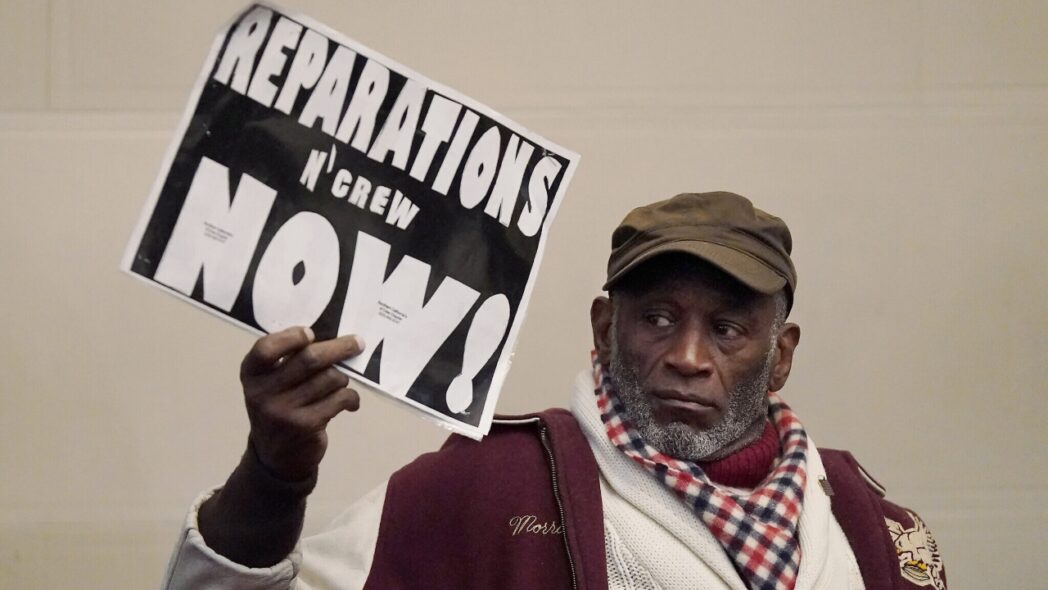An emotional Rep. Ayanna Pressley takes up historic legacy of reparations bill H.R. 40

U.S. Rep. Ayanna Pressley, D-Mass., held back tears as she officially introduced H.R. 40, legislation that has been advocated in Congress for more than 30 years.
“It is an honor,” Pressley said during a Wednesday press conference announcing her reintroduction of the reparations bill. Seconds later, Pressley paused as she became emotional before reporters and with fellow House Democrats by her side. The congresswoman continued, “…to inherit the privilege of carrying this forward from Congresswoman Sheila Jackson Lee.”
Former Rep. Jackson Lee died last year after a battle with pancreatic cancer. Pressley shared that in her last correspondence with the Texas Democrat, who notably reintroduced H.R. 40 every session of Congress for several years, she told her to “keep working on our priorities and never give up.”
The Commission to Study and Develop Reparation Proposals for African Americans Act, also known by its legislative name H.R. 40, was first introduced by Rep. John Conyers, D-Mich., in 1989. It got its name from the 40 acres and a mule promised to newly freed Black Americans by Union General William Sherman after the Civil War in 1865.
The bill would create a federal commission to study U.S. slavery and potential reparation proposals for Black Americans harmed by its legacy. Following Conyers’ footsteps, in 2019, Jackson Lee took up the tradition of reintroducing the bill. However, despite decades of effort, H.R. 40 has never made it out of committee level and to a House floor vote.
Pressley was joined at Wednesday’s press conference by Jackson Lee’s daughter and former Rep. Erica Lee Carter, D-Texas, Congressional Black Caucus chairwoman Rep. Yvette D. Clarke, and Reps. Summer Lee, D-Penn., Jonathan Jackson, D-Ill., Lateefah Simon, D-Calif., and Bonnie Watson Coleman, D-N.J.
“There is no better time to introduce this bill than during Black History Month, a time when we reflect on our history, our struggle, and our collective power,” said Pressley. “We’re at a critical inflection point in America, and the moment cannot be more urgent, with Black history under attack and white supremacy emboldened.”

Despite the likelihood of the bill being killed by a Republican majority in Congress, Pressley made clear that her reintroduced bill is not a messaging bill, as some would call it, nor is it “symbolic,” but rather a “meaningful step toward repairing the deep, structural injustices that continue to harm Black communities today.”
“The racial wealth gap in America is not an accident,” she said, as she pointed out wealth disparities between Black and white households. “This shameful reality is the direct result of generations of precise, intentional policy harm codified into our laws and budgets, and it is specifically the result of slavery and the anti-Black society that followed from Jim Crow to redlining to mass incarceration.”
The reintroduction of H.R. 40 is also timely as President Donald Trump has made diversity, equity and inclusion, or DEI, a particular target of his new administration. The president signed an executive order banning all DEI offices and federal programs.
“Trump and his lackeys are on a mission to erase the contributions of Black Americans, including the unpaid Black labor upon which our country was built,” said Rep. Clarke. “We won’t allow this history to be erased because when Black history is erased, when the value of the contributions of Black Americans [are] dismissed, it’s that much easier to dismiss the value of Black lives.”
The CBC chairwoman said that Trump and his administration officials are “scared” of Black excellence. She explained, “Deep down, they recognize their own mediocrity, and so they’re doing everything they can to entrench the racial wealth gap. They refuse to recognize that when Black America succeeds, we all succeed.”
“The reintroduction of H.R. 40 is a powerful testament to the resilience and continued work of the reparations movement, even in the face of hostile political and social climates,” said Dreisen Heath, a national reparations expert and advocate. Heath, who provided expert testimony on H.R. 40 before the House Judiciary Committee in 2021, told theGrio, “Efforts to distort truth, avoid accountability, and perpetuate unhealthy white grievances can be undercut and laid to rest by the continued advocacy around and passage of H.R. 40.”
The advocate added, “I am most excited about our bold, brilliant, and visionary new sponsor and steward of this legislation, Rep. Pressley. She represents what the moment and the ancestors are calling for.
However, Heath said that “given the lived evidence we already have about harms to Black life,” in addition to H.R. 40, she would like to see Congress advance “complimentary legislation” that would directly “implement remedies” for slavery and racial segregationist policies.
Rep. Jackson, the son of the Rev. Jesse Jackson, noted that state and local governments are already taking up the issue of reparations. In his home state of Illinois, the city of Evanston has dispersed millions of dollars to residents historically harmed by discriminatory housing practices.

“This is a national, as well as an international movement,” Congressman Jackson told reporters. “This is happening in 100 localities across the United States. So there are people of goodwill [who] are rising up, and some people simply don’t have the courage to come forward and speak truth to power.”
However, moving the ball on reparations at the federal level will be an uphill battle amid the powerful grip President Trump appears to have in Washington. Congresswoman Pressley told theGrio, “I’m not afraid of hard fights. I’m not deterred by challenging landscapes because I’ve always believed that the power of the people is greater than the people in power.”
Pressley appealed for H.R. 40 as a moral issue, explaining that “people of conscience” must recognize “the power and the necessity of the work of truth and reconciliation and healing.” She said there is also federal precedent for reparations, noting reparative actions that have been taken on behalf of Native or Indigenous communities and Japanese Americans.
When asked by theGrio about holding back tears earlier during Wednesday’s press conference, Pressley said she became emotional thinking about the “labor of love that H.R. 40 was for Sheila Jackson Lee.”
“These are unprecedented and deeply consequential times,” she said. “I’m humbled and … I feel a tremendous amount of responsibility.”
Acknowledging the passing of the torch on H.R. 40, Jackson Lee’s daughter, Erica Lee Carter, who finished out her mother’s term representing Texas’ 18th Congressional District after winning a special election in November, praised Pressley as a “warrior for justice, dedicated leader, and prominent legislator.” She said she personally asked Pressley to carry on Jackson Lee’s legacy.
“This fight against injustice is personal to her and me,” said Lee Carter. “H.R. 40 is long overdue and even more necessary under this administration, as hate is fomented, discrimination is promoted, and code words are used to bring out the worst in our fellow Americans.”
She added, “H.R. 40 does not live in the past. It is about the future of my children and all children.”






